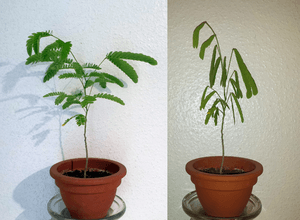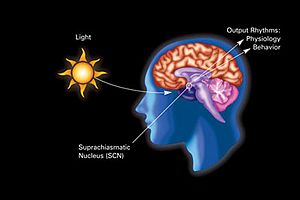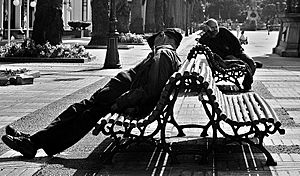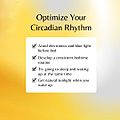Circadian rhythm facts for kids
A circadian rhythm is a natural cycle that repeats about every 24 hours. Plants and animals have these built-in cycles. They help living things know when to flower, sleep, or do other important things at the right time.
The word "circadian" comes from Latin words meaning "around a day." The study of these daily rhythms, and other biological rhythms like seasonal ones, is called chronobiology.
Circadian rhythms are "built-in." This means that even without signals from the outside world, like daylight, they keep time for about 24 hours. For example, if you were in a totally dark room, your body would still try to follow a roughly 24-hour cycle.
These rhythms are also affected and reset by signals like daylight. It's important for them to be reset regularly by the natural light and dark cycle. For humans, our natural circadian rhythm is usually about 24 hours and 11 minutes long.
These rhythms are also called the "biological clock" or "body clock." They control many body functions in humans and animals. These include when we feel hungry, when we sleep, our body temperature, and when certain hormones are made.
The main body clock in humans and other mammals is in a tiny part of the brain called the suprachiasmatic nucleus (SCN). This SCN gets information about light through your eyes. It then tells another part of the brain, the pineal gland, to release a hormone called melatonin at night. Melatonin helps you feel sleepy.
Some people have circadian rhythm sleep disorders. These can make them sleep too early or too late. Or they might sleep in many short naps throughout the day and night. One type, called Non-24-hour sleep-wake disorder, makes a person's "daily" rhythm last 25 hours or more. This means they sleep and wake up later each day. Blind people who see no light can also have this, but it's often easier to treat.
Contents
Why We Have Circadian Rhythms
Circadian rhythms help living things get ready for regular changes in their environment. For example, they help animals know when the sun will rise so they can find food. They also help plants know when it's time to open their flowers.
Being able to predict these changes gives organisms an advantage. It helps them use resources like light and food at the best times. This is why scientists think circadian rhythms were important for survival as life evolved.
How Daily Rhythms Affect Animals
Daily rhythms affect how animals sleep and eat. This includes humans! They also control things like body temperature, brain activity, and the making of hormones.
The circadian system also helps animals and plants react to the length of day or night. This is important for things like when birds migrate, when animals hibernate for winter, or when they reproduce. Knowing the changing length of daylight helps them prepare for different seasons.
Circadian Rhythms and Your Health
Taking a short nap during the day, sometimes called a "power-nap," usually doesn't mess up your normal daily rhythms. In fact, it can help reduce stress and make you more productive.
But if your circadian rhythm gets messed up, it can cause health problems. For example, it plays a role in keeping you awake and aware.
Studies have also shown that light directly affects human health. This is because of how light influences our daily rhythms.
Light Inside Buildings
The light we need for our daily rhythms is not always the same as the light we need to see clearly. Because of this, people are starting to think about how to plan indoor lighting in offices and schools. They want to make sure the lighting helps our body clocks work well.
Daily Rhythms and Body Weight
Problems with our daily body clock might be linked to obesity (being very overweight) and diabetes. These are also affected by our lifestyle and genes.
For example, people who work shift-work (like night shifts) or often have jet-lag (from traveling across time zones) can mess up their body's daily rhythms. Studies show that animals forced to eat when they should be resting gain more weight.
Why Daily Rhythms Matter for Some Jobs
Airline pilots and cabin crew often fly across many time zones. They spend many hours awake both day and night. This can make it hard for them to keep a regular sleep schedule that matches their natural daily rhythm. This can easily lead to fatigue (being very tired).
A safety board called the NTSB has said that pilot fatigue can cause accidents. They have studied ways to help pilots fight tiredness.
When Rhythms Get Disrupted
When your daily rhythms get messed up, it usually has a negative effect. Many travelers have experienced jet lag. This makes you feel tired, confused, and can cause insomnia (trouble sleeping).
Images for kids
See also
 In Spanish: Ritmo circadiano para niños
In Spanish: Ritmo circadiano para niños







